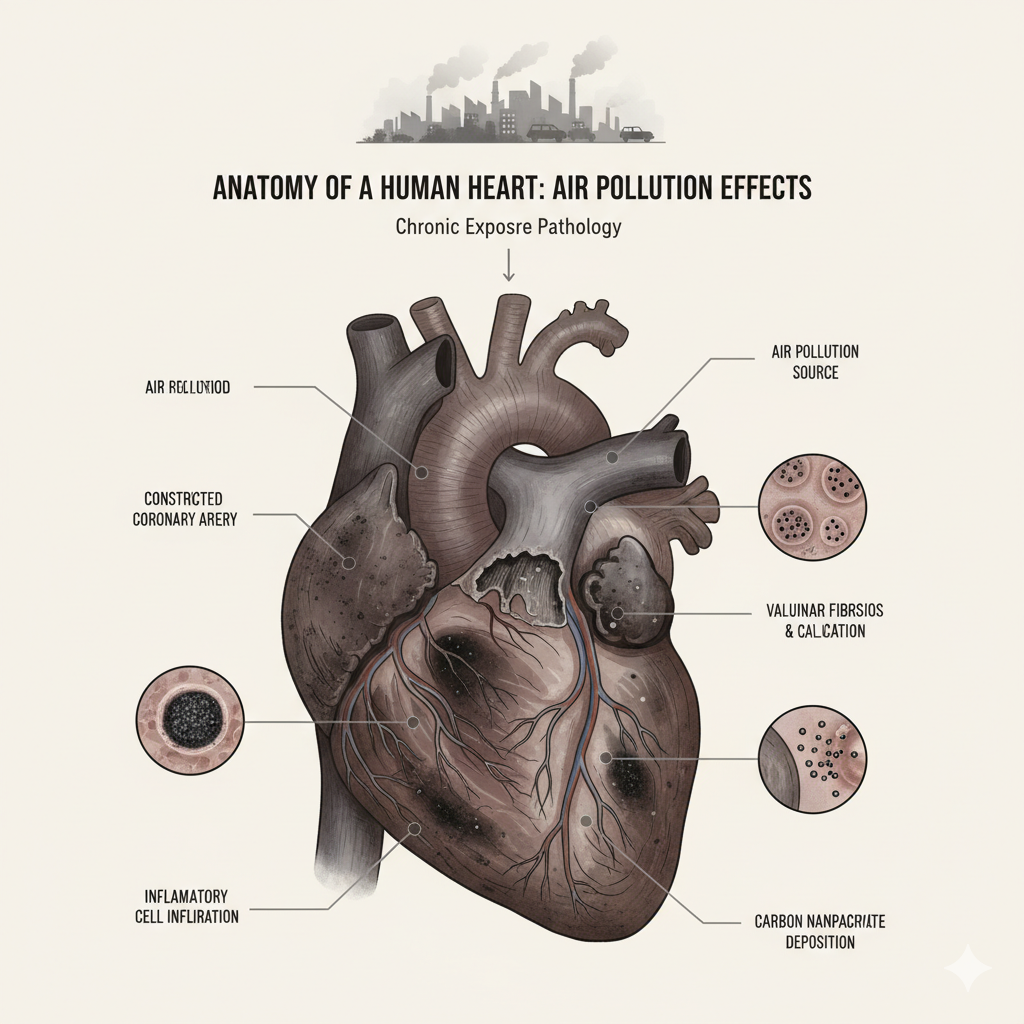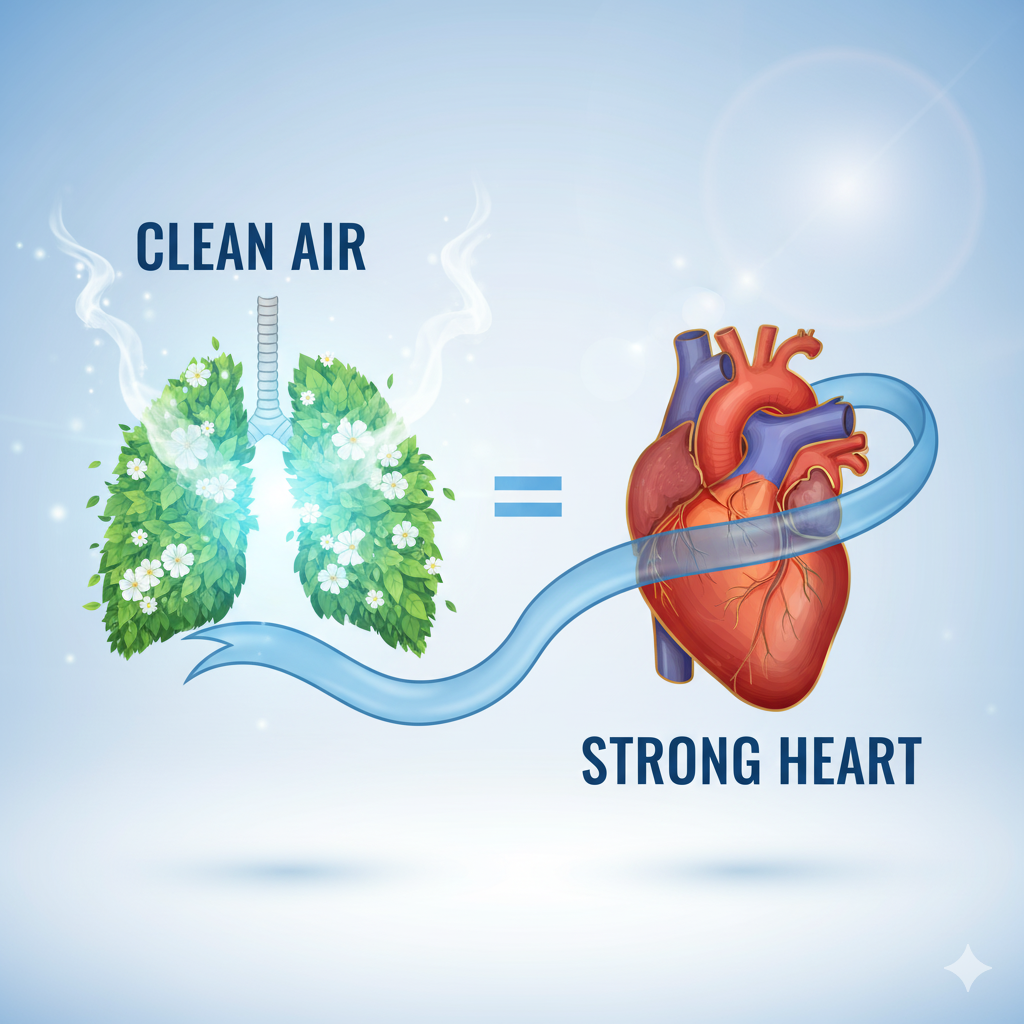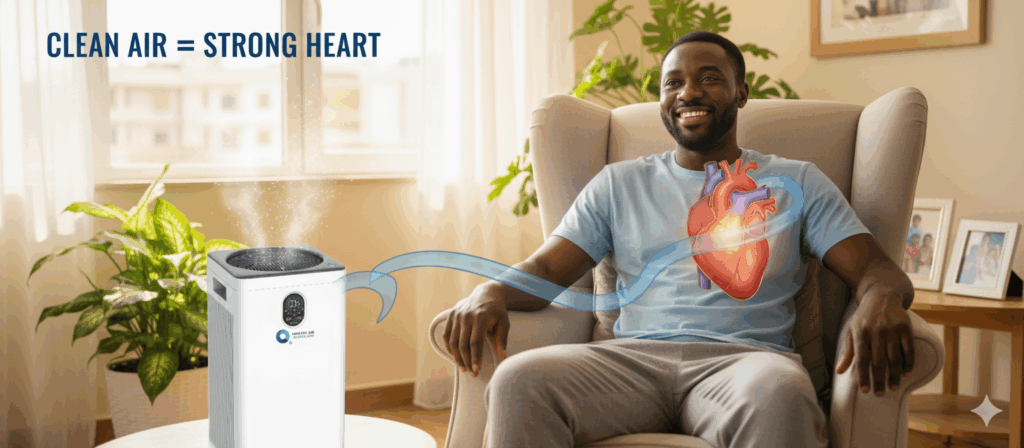Every day in Nigeria, thousands wake up with heavy chests, unexplained fatigue, or racing heartbeats. Many blame stress, poor diet, or lack of exercise. Few realize that one silent culprit is lurking in every breath they take: polluted air.
Air pollution has long been called Nigeria’s “silent killer,” but what often goes unspoken is its devastating effect on the heart. From children in classrooms to workers in traffic, polluted air is not just clouding our skies; it’s straining our hearts, stealing years off lives, and turning vibrant futures into fragile realities.
This is why the message is urgent: Don’t miss a beat.

Think of air pollutants like PM2.5, fine particles that are so tiny, tiny enough to slip past our body’s defenses and lodge deep into our lungs. From there, they enter the bloodstream, traveling directly to the heart and other vital organs of the body.
Each polluted breath:
- Increases blood pressure
- Thickens blood vessels
- Weakens the heart muscle
- Triggers arrhythmias and heart attacks
This means that every smoky cooking fire, every traffic jam, and every dust-laden classroom is quietly waging war on the nation’s cardiovascular health.
Little wonder, the WHO, in 2019, estimated that almost 70% of air pollution-related deaths globally were due to ischemic heart disease and stroke. WHO: Ambient Air Quality and Health. In Nigeria, currently ranked as 11th most polluted country globally, and with a struggling healthcare system, the danger is multiplied.
Stories We Don’t Hear Enough
In Rivers State, a young mother juggles two jobs to provide for her family. She never smoked a day in her life, yet she struggles with hypertension at 34. A health condition doctors have attributed to years of breathing polluted air both outdoors and inside her poorly ventilated home.
In Anambra, a promising student collapses during football practice. His autopsy shows heart complications suspected to be due to constant exposure to high PM2.5 levels in the city air and mould spores inside his hostel room.
And in Lagos, a banker spends his weekends at the hospital, caring for his father who suffered a sudden stroke. One who had always maintained cleanliness and healthy diets, yet doctors point not just to genetics but also to exposure to toxic air.
These aren’t isolated stories. They echo across Nigeria and Africa, cutting across income, class, and lifestyle. Air pollution doesn’t discriminate.
Clean Air = A Stronger Heart
The heart craves one thing above all: Clean and pure oxygen-rich air. When the lungs supply pure oxygen instead of a mixture of toxins, the heart beats easier, blood flows smoother, and every organ functions better.

Clean indoor air has been proven to:
- Lower blood pressure and heart stress
- Improve circulation and oxygen delivery
- Reduce risks of strokes and heart attacks
- Support longer, healthier lives
This is why protecting indoor environments; our homes, schools, hospitals, offices, and even libraries, is no longer optional. It is the frontline defense for heart health.
The Solution: Medical-Grade Innovation
Technology is giving us a fighting chance. The Healthy Air DNO Catalyst Purifier is not just another filter; it’s a medical-grade solution fit for medical and non-medical indoor environments.
Here’s why it matters:
- Destroys 99.99% of pollutants at the molecular level including PM2.5, mould spores, bacteria, viruses and VOCs.
- No harmful by-products are released, unlike ozone-based systems and units that emit carcinogenic by-products
- Energy-efficient and runs 24/7: fit for classrooms, hospital wards, offices, and homes.
- Child lock and digital control panel: practical for families, hospitals, and schools. Easy to use without fear of damage.
With innovations like this, we can finally breathe easier and protect our hearts.

A Call for Collective Action
The fight for clean air is too important to leave to individuals alone. We must call on:
- National bodies to make air quality a priority in healthcare policies.
- NGOs keen on heart health like the Kanu Heart Foundation to integrate indoor air quality into heart health advocacy.
- The Nigerian Medical Association to lead the movement for healthier, safer hospital environments by implementing installation of Healthy Air Purifiers in theatres, ICUs, and Neonatal wards.
- Schools and businesses to adopt indoor air purification as part of their duty of care.
Air pollution is not just an environmental issue; it’s a public health crisis. And every unchecked breath puts our future at risk,
Don’t Miss a Beat
Every heartbeat is a gift. But polluted air is stealing them, one by one.
We can’t afford to ignore the crisis. Not when clean air solutions exist. Not when families are losing loved ones to preventable heart conditions. Not when a simple act of installing a medical-grade purifier, transforming homes, schools, and hospitals into safe havens is available.
The truth is clear: clean air is not luxury; it’s survival.
This World Heart Day, let’s not wait until another life is cut short. Let’s act now, don’t miss another beat.


